by | Nov 15, 2020 | Featured
Meet the 2021 PRSA Kansas Board Slate
President Kristy Bansemer, City of Derby
President-Elect Akeam Ashford, Sedgwick County
Secretary Jennifer Eaton, KU School of Medicine-Wichita
Treasurer Carol Streckfus, APR, Cohlmia Marketing
Communications Chair Meghan Carver, Greater Wichita Partnership
Public Relations and Social Media Chair Ashtyn Rottinghaus, Textron Aviation
Ethics Chair Jamie Reed, APR, Starkey, Inc.
Accreditation Chair Cynthia Wentworth, APR
Bylaws Chair Rachel Bell, Kansas Turnpike Authority
Membership Chair Jennifer Strong McConachie, Nye and Associates
Diversity & Inclusion Chair Delane Butler
Immediate Past President Kim Kufahl, Wichita State University – Career Development Center
At-large board member Jennica King, Sedgwick County Zoo
At-large board member Wendy Johnson, APR, Wichita Public Schools
At-large board member Kate Flavin, Sedgwick County
At-large board member Susan Dyer, Heartland Credit Union Association
At large board member Ashton Maxfield, APR, Master Plan Communications

by | Sep 22, 2020 | Food for thought, National, Professional Development

September 2020
Compiled by PRSA Kansas Board Member Jamie Reed
The provisions of ethical conduct defined by PRSA – advancing the free flow of accurate and truthful information, safeguarding confidences, building trust by revealing information needed to make a responsible decision – have never seemed more relevant than in the era of COVID-19.
As we work to continue counseling our leaders and clients six months into this pandemic, Linjuan Rita Men’s article on “Wartime Leadership Communication: How Should CEOs Communicate During the COVID-19 Pandemic?” (instituteforpr.org) has insightful tips for us as public relations professionals and those we advise:
- Be transparent. Share information in a frequent and timely manner and be honest about the true impact to your organization or business. Listen – really listen – to employees as they share their opinions and concerns.
- Convey authenticity. Leaders should admit there is no playbook for a pandemic, and that they have many of the same worries as other employees. Yes, there will be a need for some tough decisions, but the human side of leaders is what will resonate with employees.
- Show empathy. Demonstrate a sense of caring with phrases like “I feel you,” “those emotions are legitimate and understandable” or “we are in this together.”
- Demonstrate optimism. Foster hope and gratitude by focusing on some of the silver linings of the pandemic, such as adapting to new ways of working and connecting and a stronger sense of community.
September is PRSA’s Ethics Month. For a refresher on the PRSA code of ethical principles, visit: www.prsa.org/about/ethics/prsa-code-of-ethics.
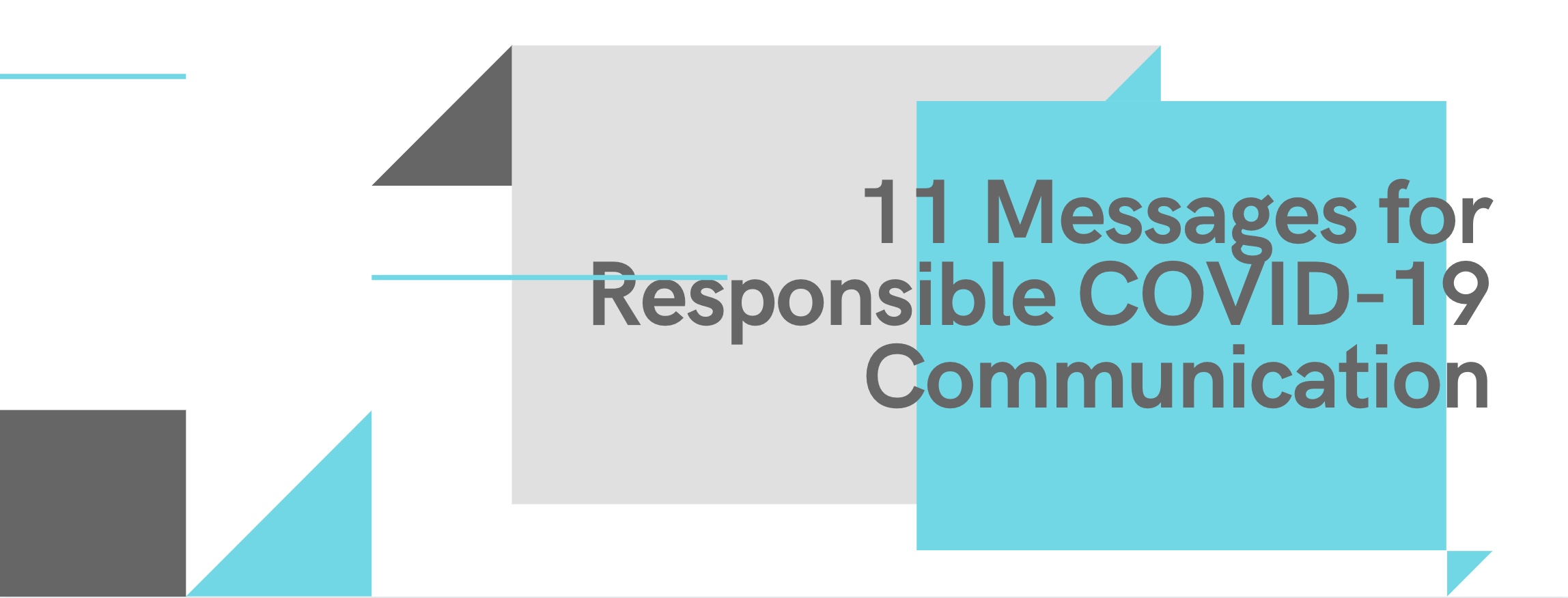
by | May 14, 2020 | Professional Development
May 14, 2020
By Jamie Reed, Starkey Director of Communications
The Global Alliance for Public Relations and Communication Management released the following tips for providing responsible communication during COVID-19. As PR professionals, it’s important to be aware of best practices in the industry, especially during a crisis that has left no person, employee or stakeholder unaffected. 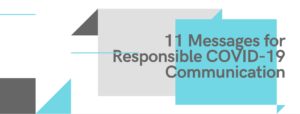
Source
1. Before [you] communicate, think about the impact of your message beyond your organization.
2. Do not hide the impact of the pandemic. Be realistic in your communications, based on facts.
3. Use straightforward, plain language to minimize dramatizing the situation.
4. Include hope in the spirit of the communications.
5. Spread good examples and practices.
6. Identify and legitimize people’s emotions.
7. Give priority to messaging from official sources.
8. Avoid sharing fake news. Be critical of sources of information.
9. Don’t saturate networks with messages.
10. Don’t spend time criticizing public communication. Try to cooperate with them to improve.
11. Support the work of the media providing accurate information in the right moment.

by | Apr 8, 2020 | Business

As a skilled public relations professional, you know that your success is dependent on staying relevant, resourceful, and inspired.
The Accreditation in Public Relations (APR) credential certifies your drive, professionalism, and principles, setting you apart from your peers and positioning you as a leader and mentor in the competitive public relations field.
If you have questions about accreditation or what to learn about the APR scholarship email PRSAKansas@gmail.com
Learn More
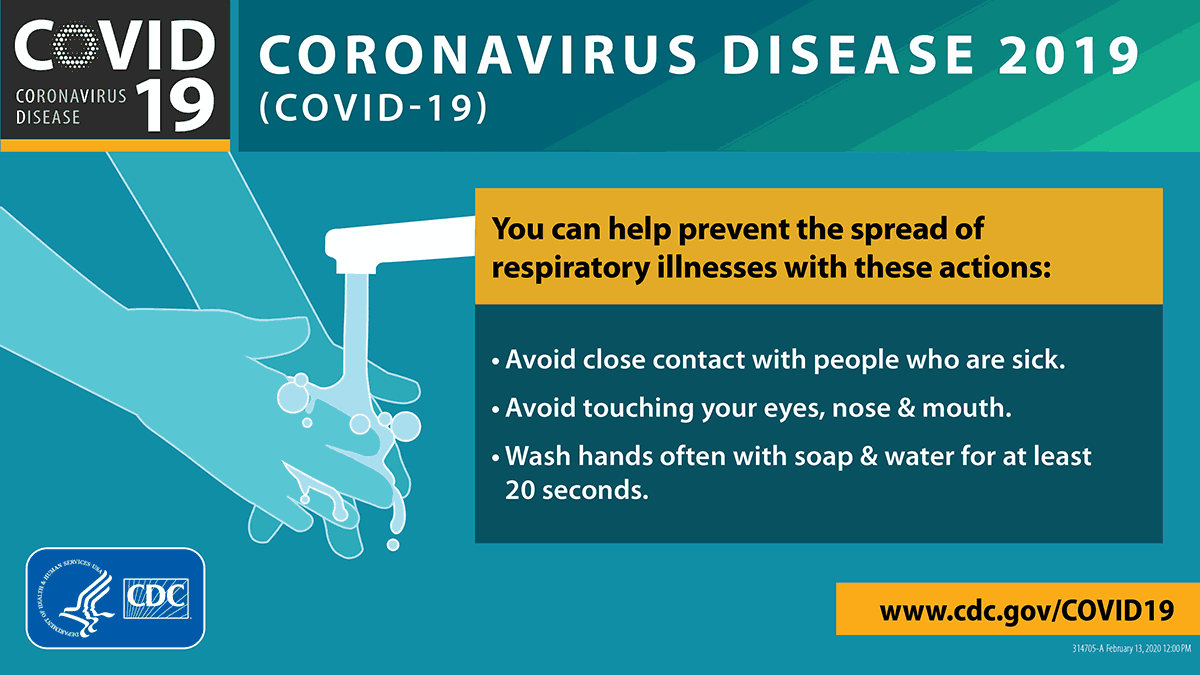
by | Mar 12, 2020 | Food for thought
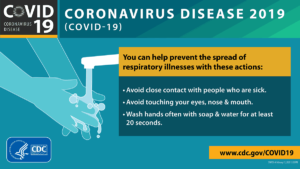 During times of uncertainty, it’s no secret that employers turn to its PR and communication professionals to help ease tensions and navigate next steps. Take advantage of the resources and articles below to help in your internal and external communication efforts.
During times of uncertainty, it’s no secret that employers turn to its PR and communication professionals to help ease tensions and navigate next steps. Take advantage of the resources and articles below to help in your internal and external communication efforts.
Interim Guidance from the Centers for Disease Control and Prevention
Advice and Resources from PR Daily
Tips from PR Week
Sedgwick County Information
CDC Information on Preparing for a Large Event
Recommended practices to implement in your organization:
- Wash your hands properly and often – sing the 20-second chorus to these songs
- Make hand sanitizers available in all heavily trafficked areas
- Disinfect often-touched items: elevator buttons, phones, door handles, etc.
- Create a plan for continuity if workers need to work remote
- Urge employees who aren’t feeling well to stay home and seek medical attention when necessary
The PRSA communities is another great resource for PR pros researching the coronavirus. As a member benefit of PRSA, the online communities allow members to post resources, share ideas and network. There were several threads about the coronavirus in the PRSA forums, one in the crisis communication community and one in the open forum community. You must be a PRSA member to access the links. Members shared plans, posted tips for internal and external communication and other information.

by | Feb 6, 2020 | Food for thought, Uncategorized
Written by Rachel Bell
Director of Business Services and Customer Relations
Kansas Turnpike Authority
My daughter just turned 14 which means she’s eligible to take the test for a learner’s permit. To help apply what she’s learning to real life, I’ve been pointing out driving behaviors whenever we are in the car. As I’ve been teaching her, it has occurred to me that driving is like good communication.
- Be clear about your intentions. In driving, we use our turn signals and brake lights to tell other drivers where we are heading. In communication, we must clearly state what we need the audience to know. In this fast-paced society, most audiences do not have time for the prose and no one wants to hear corporate speak fluff.
- Use your tools wisely. Don’t leave your blinker on or honk your horn unless absolutely needed. In good communication, we must choose the tools that are effective to get our message out.
- Anticipate the actions of others. On the roadway, this is called defensive driving. In communication, it helps shape key messages and reflects positively on you and your organization. What do you want your audience to know and, more importantly, what do they need to know?
- Agree upon rules (goals). We have traffic laws that are mutually agreed upon or you won’t receive a driver’s license. Good communication also involves clearly understanding and agreeing upon the rules (goals) within your or your clients’ organizations. What are you trying to accomplish? On the roadway, you want to get to your destination safely and on time. In communication, you want to avoid being blindsided.
In communication and public relations, you’re never done learning. Join PRSA Kansas to accelerate your learning, network and advance the PR profession. Learn more on the PRSA Kansas membership page.
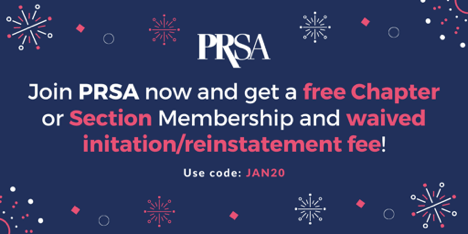
by | Jan 14, 2020 | National, Professional Development

Achieve your 2020 careers goals with a PRSA membership. Sign up with code JAN20 to get a FREE 1-year Chapter (up to $100 value) or a FREE 1-year Section (up to $65 value). Some restrictions apply. Mark one resolution off your list and become a member today at: https://apps.prsa.org/JoinUs/membershipApplication
by | Jan 29, 2019 | Food for thought
By Susan Dyer, At-Large Director
Thank you to those of you who filled out our fall survey. PRSA’s mission is to “make communications professionals smarter, better prepared and more connected through all stages of their career,” and your survey feedback will help our chapter provide value to PR pros in Kansas. Last year, we told you we’d be more transparent and honest with you, so we’re sharing the survey results here.
This infographic gives an overview. Scroll down to read the full results.
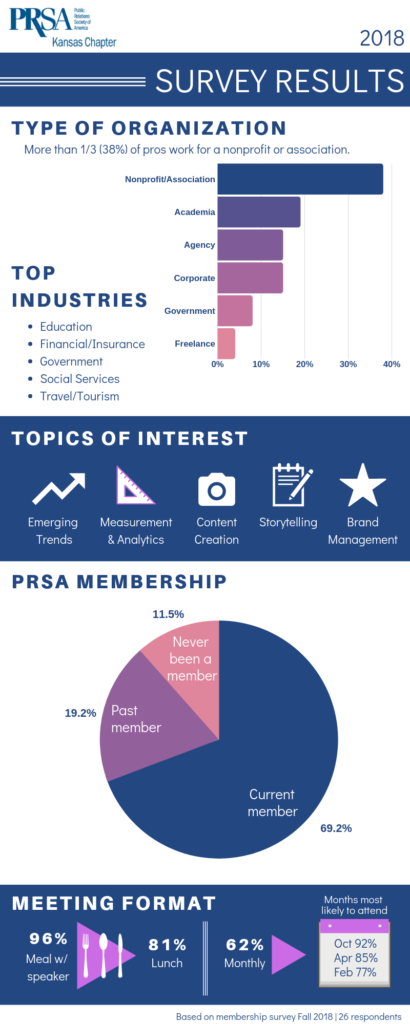
Full Survey Results
How long have you been in the Communications field?
0% Less than 5 years
8% 5-10 years
76% 10+ years
16% 25+ years
Which best describes your organization?
38% Nonprofit/Association
19% Academia
15% Agency
15% Corporate
8% Government
4% Freelance
What industry are you in?
15% Education
15% Agency with serving several industries
15% Social Services
12% Travel/Tourism
12% Financial/Insurance
12% Government
4% Health Care/Hospital
4% Law Enforcement/Safety
4% Manufacturing
7% Other: Retail, Business Association
0% Entertainment/Sports; Food; Energy/Utilities; Mass Media/Publication; Technology
Which topics would you like to learn more about during events/meetings? Percent of respondents who chose topic as first, second or third choice.
73% Emerging trends/technology
58% Measurement/data analytics
54% Content creation
42% Storytelling
42% Brand/reputation management
19% Crisis management
27% Media relations
19% Advancing your career
Other topics not listed: Communication law and ethics–new issues
Which time works best for you to attend events/meetings?
81% Lunch
8% After work
0% Morning
11% Other (weekends, during work hours, lunch or after work)
What is your preferred format for meetings? Choose all that apply.
96% Meal with speaker
31% Networking/social
23% Group webinar
8% Other (conference, speaker or webinar)
How often should we have meetings/events?
62% Monthly
19% Every other month
12% Quarterly
8% Other (monthly supplemented by other activities, monthly but change format)
Which month(s) are you most likely to attend meetings? (In order of most votes).
92% October
85% April
77% February
73% January
73% March
73% August
73% November
69% May
65% September
54% June
46% December
42% July
How much are you willing to pay for a lunch meeting with a program?
35% $18 members/$28 non-members
42% $20 members/$30 non-members
8% $25 members/$35 non-members
15% Other
Which best describes you?
69% I am a current member of PRSA
19% I am a former member of PRSA
12% I have never been a member of PRSA
If former member or never been a member, why not?
27% Too expensive
18% Little value
9% I let my membership lapse
45% Other
Comments:
Member of IABC; little value to a veteran practitioners; Clients didn’t appreciate the need for an APR, which became expensive to maintain.
If current member of PRSA, would you recommend becoming a member of PRSA?
71% Yes
0% No
14% Not sure
14% Other:
Comments: I would absolutely encourage people to join our local chapter, which means, sadly, they have to join national, too. I think there is much more value in the local chapter than national.
What is the most important reason to join or stay in PRSA?
36% Monthly meetings
28% Networking
16% Educational training through PRSA webinars and conferences
12% Career advancement and certification
8% Other
Comments:
I don’t have just one reason …I appreciate the learning opportunities at the monthly meetings and development day, the friendships with others who work in communications and the knowledge they share and it’s also challenging because it provides the chance to get out of my comfort zone and try and learn new things.
Both monthly meetings and networking with other pros.
Contact Susan: sdyer@heartlandcua.org / LinkedIn
by | Sep 20, 2018 | Uncategorized
The Kansas Chapter of the Public Relations Society of America hosts an annual Professional Development Event to educate communication professionals. This year we are excited to welcome Jane Dvorak, 2017 National PRSA President and Silver Anvil award-winner, as our keynote speaker. Jane is a high-energy, Denver-based freelance PR consultant whose knowledge and creativity will inspire us and help us do our jobs more efficiently.
This year’s Professional Development Day is October 23 at Mark Arts, 1307 N. Rock Road, from 8:30 a.m.-1:30 p.m.
The event will be an exceptional and affordable way to showcase your organization before an audience of 75 public relations professionals. This year we also are extending intentional invitations to college students, knowing they will benefit from the wisdom and expertise in the room.
Sponsorship levels and benefits include:
- $500 – Four event tickets, logo placement on all materials/event recognition, ability to place marketing materials on all tables, opportunity to offer brief remarks. Two people from your business or organization also are invited to join Jane and others from the Kansas PRSA Chapter for dinner on Oct. 22, at your expense.
- $250 – Two event tickets, logo placement on all materials/event recognition, ability to place marketing materials on all tables, opportunity to offer brief remarks.
- $125 – One event ticket, logo placement on all pieces/event recognition.
In addition, we will have breakout sessions that include measurement/analytics and storytelling, as well as a new professional and student-focused career session.
For more details, or to become a sponsor contact Kathy Lefler, at (316) 269-0755 ext. 109, KathyL@wichitahabitat.org.
by | Jun 12, 2018 | Food for thought, Uncategorized
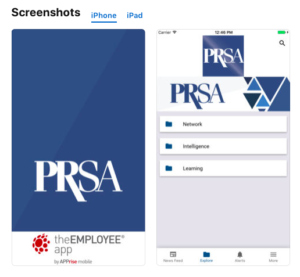 By Jennifer Strong Worrell, PRSA Kansas At-Large Director
By Jennifer Strong Worrell, PRSA Kansas At-Large Director
Did you know that PRSA has several apps?
Through the PRSA app, members have convenient access to the latest edition of PRSA’s Issues and Trends publication, webinars, association web portals, exclusive content, a new podcast series, and more. The PRSA Membership App is the official member app of the Public Relations Society of America and the PR industry.
Ethics App
PRSA also has an Ethics app for members to always have at their fingertips, a must-have for PRSA members in today’s media environment.
The PRSA Ethics app is based on the PRSA Code of Ethics, public relations’ oldest code of professional conduct. The PRSA Code of Ethics helps practitioners navigate ethics principles and applications. The code sets out guidelines built on core PRSA values like advocacy, honesty, loyalty, professional development and objectivity.
All valuable information for PRSA Kansas members to have and apply in our daily practice.
Download the PRSA app: iOS | Google Play
Please note: you must create an account. Your MYPRSA log in will not work. Click here for more information.
Contact Jennifer: jens@nyeandassciates.com | LinkedIn
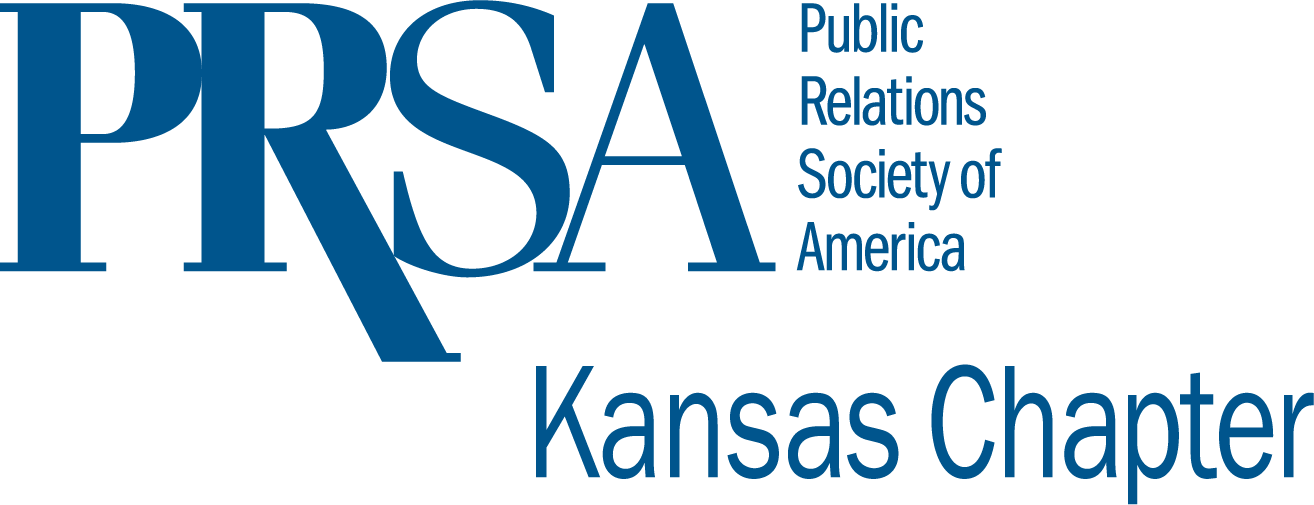







 During times of uncertainty, it’s no secret that employers turn to its PR and communication professionals to help ease tensions and navigate next steps. Take advantage of the resources and articles below to help in your internal and external communication efforts.
During times of uncertainty, it’s no secret that employers turn to its PR and communication professionals to help ease tensions and navigate next steps. Take advantage of the resources and articles below to help in your internal and external communication efforts.



 By Jennifer Strong Worrell, PRSA Kansas At-Large Director
By Jennifer Strong Worrell, PRSA Kansas At-Large Director
Recent Comments